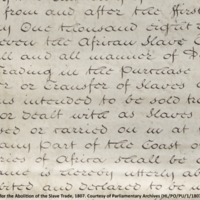
Black History Day in North Walsham
Several one-day events to mark the bicentenary and Black History Month were organised by the Griffon Area Partnership, a creative arts group in North Walsham. Totem poles were created and displayed at a community festival, which also featured crafts, mask-making, storytelling, dance and colour therapy healing.
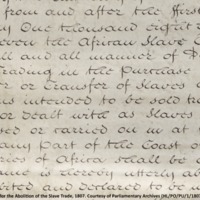
The Case for Immediate Not Gradual Abolition of Slavery
In the 1820s, the campaigner Elizabeth Heyrick became actively involved in door-to-door visits in Leicester in support of the anti-slavery cause and sugar boycotts. Her pamphlet ‘Immediate not gradual Abolition’ went into three editions during the first year of its publication in 1824. This exhibition focused on the life and work of Heyrick and in particular her efforts to abolish slavery. A Family Learning Day included ‘Elizabeth Heyrick’ in costume reading her pamphlet, storytelling, gospel music and an opportunity to sample food that would have been eaten by the enslaved.
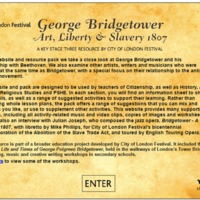
George Bridgetower: Art, Liberty and Slavery 1807
In this website and Key Stage 3 Resource Pack, the City of London Festival examined the work of the Afro-European violinist George Bridgetower (1778-1860) and, in particular, his relationship with the composer Ludwig van Beethoven. The resource also explored the role of other artists, writers and musicians who were active at the same time as Bridgetower, with a special focus on their relationships to the anti-slavery movement. The website provided music, video clips and worksheets, alongside an interview with Julian Joseph, composer of the jazz opera Bridgetower - A Fable of 1807, toured by English Touring Opera. The resource was part of a broader education project developed by City of London Festival, which included the exhibition, 1807: The Life and Times of George Polgreen Bridgetower, held in the walkways of London's Tower Bridge. The education project also included storytelling, music and creative writing workshops in secondary schools.
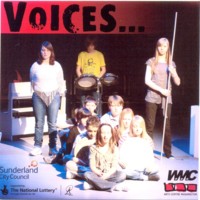
Voices...
A collaborative project between Arts Centre Washington's Youth Theatre and Washington Music Collective, providing development of live music activities for young people within Washington and the surrounding areas. The project involved improvisation, creative writing, music and drama workshops for young people during school holidays, and culminated in a thirty minute play around the themes of slavery. A DVD was produced featuring musical shorts and video diaries of the young actors' experiences. One theme covered was the limbo dance, originating in Trinidad and Tobago, and with symbolic links to enslaved people entering the galleys of a slave ship.
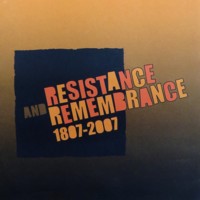
Resistance and Remembrance: Marking the 200th anniversary of the Parliamentary Abolition of the Transatlantic Slave Trade
Part of the British Museum's Atlantic Trade and Identity season, Resistance and Remembrance was a commemorative public day held at the British Museum on 25 March 2007, in association with the Royal African Society and Rendezvous of Victory. Placing a strong emphasis on resistance to the slave trade, the day included poetry readings, storytelling with Beyonder and H Patten, Bonnie Greer and Tony Sewell in discussion, and dramatised contemporary accounts of life as a slave. The day culminated in a Ceremony of Remembrance in the Museum's Great Court, featuring the telecast of a special message from Nelson Mandela.
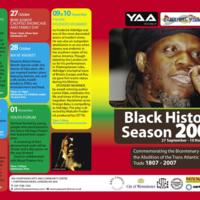
Black History Season 2007: Commemorating the Bicentenary of the Abolition of the Trans Atlantic Slave Trade 1807-2007
A programme of events and activities for Black History Month 2007 from Yaa Asantewaa Arts and Community Centre had a particular focus on the bicentenary. The programme included theatre, youth projects and family days. Calypso Fuh So performed special Calypsos to mark the bicentenary, and YAA/Carnival Village organised a commemorative walk to remember ancestors who died in slavery, and the Black presence in Britain. Ritual Theatre Arts created a film celebrating thirty years of African dance in Britain and International Word Power featured performances of poetry, storytelling and song.
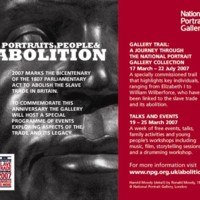
Portraits, People and Abolition
The National Portrait Gallery created a new gallery trail to mark the bicentenary, written by Dr Caroline Bressey. The trail highlighted portraits of key individuals, ranging from Elizabeth I to William Wilberforce, linked to the slave trade and its abolition. Portraits included those who invested in the trade, or who owned slaves and supported slavery, as well as images of enslaved people themselves and of people who were prominent in the movement to abolish the trade. The trail ended with a series of contemporary portraits of individuals involved in preventing slavery today. A week of talks, music, film and family activities included a discussion of the painting 'The Anti-Slavery Convention, 1840' by Benjamin Robert Haydon.
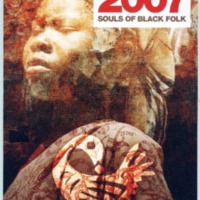
Black History Season Leicester 2007: Souls of Black Folk
Leicester's Black History Season in October-November 2007 marked the bicentenary of the abolition of the slave trade. Its aim was to redress the balance from a 'Eurocentric point of view' of abolition, and focus on the Afrikan perspective with the theme of 'Souls of Black Folk'. Musical performances included gospel, Motown, reggae and jazz. Other events in venues across Leicester and Loughborough included traditional South African dance, contemporary dance, performance poetry, comedy, multimedia performances, storytelling, theatre and an exhibition, 'Africa's Gift', focusing on the economic and cultural contributions of the slaves and their descendants.
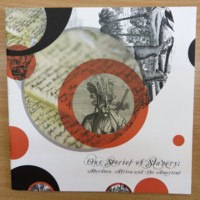
Our Stories of Slavery: Aberdeen, Africa and the Americas
The Our Stories of Slavery events programme ran from May to October 2007, co-ordinated by the Arts Development team at Aberdeen City Council. The project examined all aspects of Aberdeen's links with slavery and the transatlantic slave trade, including the role of Aberdonian landowners as slave owners, as well as the impact of Aberdonians as abolitionists, such as the roles played by James Beattie and James Ramsay.
One focus of the project was on the role of Aberdonian magistrates in kidnapping children from the City and Shire and selling them into indentured service to plantation owners during the 18th century. Peter Williamson, known as 'Indian Peter', was one of up to 700 kidnapped in Aberdeen between 1735 and 1750. The project used his story, with archives at the University of Aberdeen, in a range of activities including storytelling, re-enactments, film making, workshops, creative writing and craft workshops. Kidnapped was a re-enactment set in and around The Tolbooth (Aberdeen's Museum of Civic History). In collaboration with artist Chris Biddlecombe, community knitting circles created 'Cast-offs', exhibited at Aberdeen's Kirk of St Nicholas, whereby an installation of 600 knitted jumpers represented the abducted children.
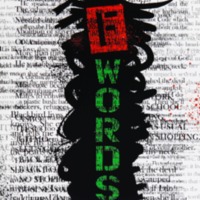
FWords
FWords was a creative response of eight Yorkshire writers and artists to the commemoration of the Abolition Act, in a project led by Peepal Tree Press in Leeds. Focusing on the many variations of the theme of 'Freedom', Fwords was created to raise the profile of Yorkshire's rich heritage of talented artists, descendants of those who migrated, forcefully and otherwise from Africa and beyond. The work of six writers was illustrated with work from two visual artists, and with a foreword from Caryl Phillips. The project was supported by printed materials, broadcasts, digital and dedicated web pages.
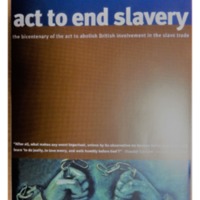
Set All Free Gloucestershire
The Gloucestershire Set All Free initiative was organised by Churches Together in Gloucester and other organisations to mark the bicentenary. An Events Guide set out some of the events, lectures, film screenings, music festivals and exhibitions taking place in Gloucestershire to remember the horrors of transatlantic slavery, while also making clear the imperative to take action to end modern forms of slavery. There were bicentenary related activities at Gloucester City Museum and Art Gallery and Cheltenham Art Gallery and Museum. There were also a number of events at Gloucester Cathedral and local churches, including St Mary's in Wotton-under-Edge. Two exhibitions focused on contemporary slavery were organised by the Anti-Slavery International League. The Guide also includes details of various festivals with a focus on the bicentenary, including the 1 World Festival Freedom 07, the Gloucester International Rhythm and Blues Festival and Cheltenham Music and Literature Festivals.
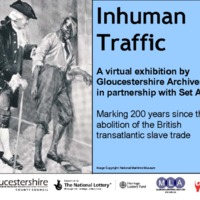
Inhuman Traffic
The Inhuman Traffic project was led by Gloucestershire Archives, in partnership with the Set All Free initiative. The virtual exhibition and accompanying web resource were based on documents held at Gloucestershire Archives and, in particular, the papers of the anti-slavery campaigner Granville Sharp (1735-1813). The exhibition explored topics such as the contribution of black people to the abolition movement, aspects of the legacies of slavery, including racism and domestic violence. Over 400 copies of the exhibition DVD were sent to schools, churches, tourist information venues and individuals across Gloucestershire. The associated programme of events included performances of the play 'Inhuman Traffic', developed in collaboration with a local theatre company, Spaniel in the Works. The play features four interacting characters with different perspectives on slavery. A cross-curricular teaching resource was later developed, which included a second performance, 'Master and Slave', in partnership with Stroud District Museums Service, Spaniel in the Works, and Parliament Primary School, Stroud.
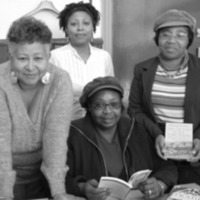
Interwoven Freedom
SCAWDI are a Birmingham-based community group specialising in working with local volunteers to research the early presence of Black people in the West Midlands. In collaboration with English Heritage, ‘Interwoven Freedom’ enabled a group of local women to visit archives, exhibitions and historic sites and explore the role of women in the abolitionist movement. The participants drew on traditions of abolitionist women such as Elizabeth Cadbury creating and distributing workbags filled with anti-slavery manifestos by making their own textile bags from fair trade cotton and African cloth. They wrote their own manifestos which mixed historical facts with fictional stories and poems. The accompanying exhibition of textiles, text panels and an audio documentary toured London and 11 regional venues. The exhibition included photographs documenting the project by photographer Vanley Burke.
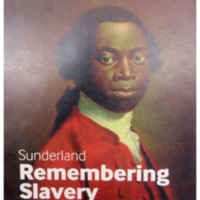
Sunderland Remembering Slavery
Remembering Slavery 2007 involved museums, galleries and other cultural organisations across the North East of England in a programme of exhibitions, events, performances, lectures and activities to explore the themes of slavery and abolition, and identify connections with the region.
In Sunderland, the Museum and Winter Gardens hosted a varied programme of activities under the Remembering Slavery 2007 umbrella, including African drumming sessions, African inspired textile crafts, poetry workshops and storytelling. There were also guided walks around the sites associated with James Field Stanfield, the leading Sunderland campaigner against the slave trade. Elsewhere in the city, The Power of Words: an Image of Africa Past and Present was a creative writing project in collaboration with the Sunderland African Association. Participants worked with poet and writer Sheree Mack to produce poems exploring slavery and its relevance in contemporary times.